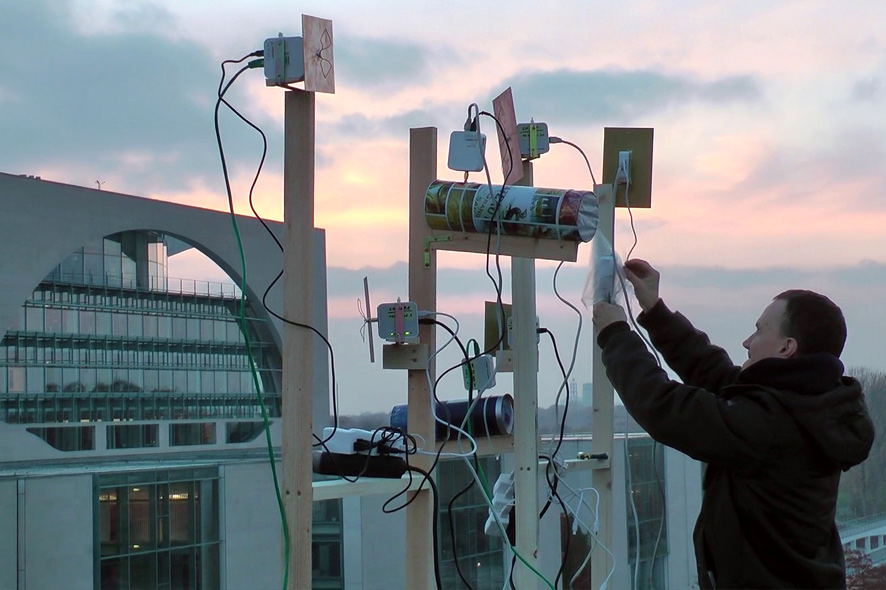Whistleblower Edward Snowden’s disclosures made it common knowledge that the federal government district in Berlin, the site of institutions such as the German Bundestag, the federal chancellor’s office, foreign embassies, and headquarters of many media outlets and other organizations, is the target of constant surveillance and espionage by intelligence agencies. With their temporary art installation entitled “Can you hear me?” that was recently honored with the Golden Nica grand prize in the 2016 Prix Ars Electronica’s Interactive Art + category, Christoph Wachter and Mathias Jud address the issue of power and powerlessness in the Digital Age.
Above the rooftops at the epicenter of political power in Germany, the two artists set up an autonomous WiFi communications network and invited anyone in Central Berlin with a WiFi-capable device to connect to the network and use it to chat, send text messages and exchange files. Employees of embassies and government agencies were also cordially asked to take part. Plus, anyone who was interested could send messages to the American NSA and the British GCHQ on the exact frequencies they were monitoring. So instead of covert surveillance, what emerged was a collective conversation sphere in which everybody had the same rights. This anonymous, independent network was used by thousands of people; over the course of 33 days, more than 15,000 messages were conveyed to the NSA and GCHQ. Mathias Jud talked to us about what led up to this action, and how the general public and the intelligence agencies reacted to it.
You came up with the idea of “Can you hear me?” during your visit of the Swiss Embassy in Berlin. Could you tell us more about the first hours of your thoughts about this project?
Mathias Jud: It was just something different. The Swiss diplomats had an interest in our work and that is why they had invited us to present it at the occasion of an event at the Embassy.
In earlier works, we have explored the conditions and limits of digital communication. Among other things, we developed tools to investigate and overcome Internet censorship. The conditions and limitations of individual communication and expression are also fundamental for politics and society; therefore, the diplomats had probably an interest in our way of working. Of course, the specific situation in Berlin’s Government District and the interception posts at the US and British Embassies aroused our interest. Both embassies had secret listening devices mounted on their roofs to spy on the population, the government, and even the mobile phone of Angela Merkel.
However, Switzerland is not quite the superpower and it has no geopolitical power ambitions. It is a small country with a very wide-ranging democratic voice. That is why it made sense to oppose the secret interception centres of the superpowers in an open communications network, which is indeed, in turn, tapped, but at the same time offers anonymity to those who speak. It is an inversion. What is here developed instead of the infiltration and wiretapping is a communication and comment option for the population, a plurality of voices with an open, free form of contributions and expressions.
It is also exciting because we usually cannot talk about everything. The surveillance makes us speechless. To talk about censorship or surveillance does not suffice because these particular conditions are directly embedded in our perception, our different representations, and in our language. It made sense, however, simply by the possibility to make this direct connection of surveillance and interception experienced, and that in such a way that we can gain new options out of it. We were able to create concrete opportunities for action that break an overpowering regime of wiretapping and bring out a wide population of powerless.
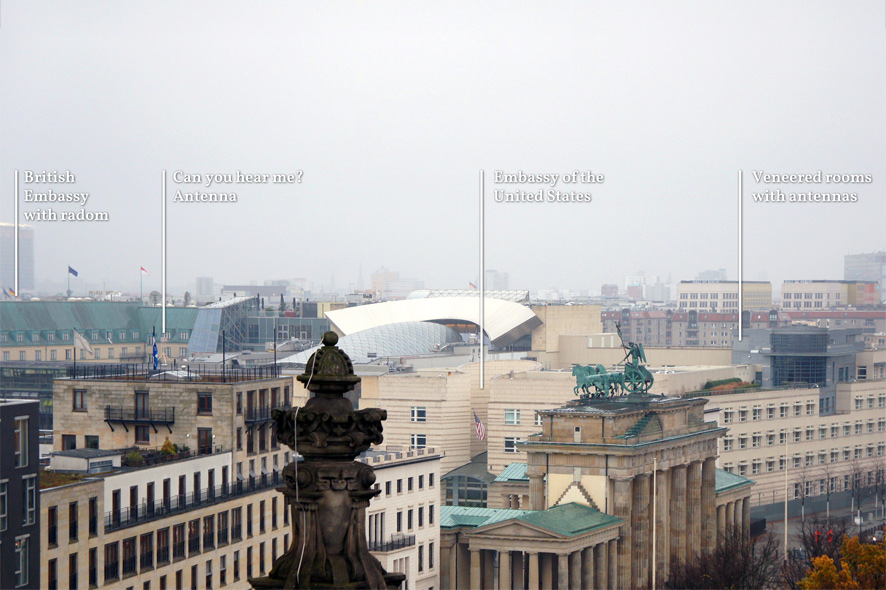
The German Government District in Berlin. Credit: Christoph Wachter, Mathias Jud
In the end, you’ve set up antennas at the roofs of the Swiss Embassy and of the Academy of Arts in Berlin. How difficult was it to find the right spots for the network in the Government District?
Mathias Jud: Presumably there is no corner in the government district that is not intercepted. So we could have set our devices anywhere. We wanted a direct link to the eavesdropping posts and the best connection was in a direct line of sight. Therefore, we were pleased to be able to install a large antenna on the roof of the Academy. We had a perfect connection. One problem was that only a very small roof hatch led to the roof of the Academy, so we had to find a construction easy to assemble on the roof. It was an oppressive situation during the construction; we were supervised by a helicopter. It’s a strange, lonely, and strictly controlled place, just a few meters from the Brandenburg Gate, where the crowds stroll.
What were the best text messages that have been submitted to the NSA and CGHQ via your network?
Mathias Jud: In communication forums, we distinguish between major political voices and mediating or conciliatory statements. We read the intimate confessions or open appeals and wonder about the ricochet shots and eventual troublemakers. We had all that too. There were very meaningful political messages, really long debates, and also very original or sarcastic remarks. But what I liked most was that we lost the categories in the process. In the open context of “Can you hear me?” where it was possible to address anonymously the secret observer, everything was a comment and a postulate at once; moreover, each statement became a performative act and a sensible attitude. The wide range of statements and even a lively jumble of languages and dialogues were impressive manifestations that a mass surveillance permeates indeed all areas of our life in which every human emotion and excitement is reflected. The private and sometimes embarrassingly intimate material that was revealed here made it clear that there is nothing private anymore. The appeal to the eavesdroppers was a situation that showed that these will never come out in the open. It’s an exciting exploration of what it means to communicate in a situation of total surveillance.
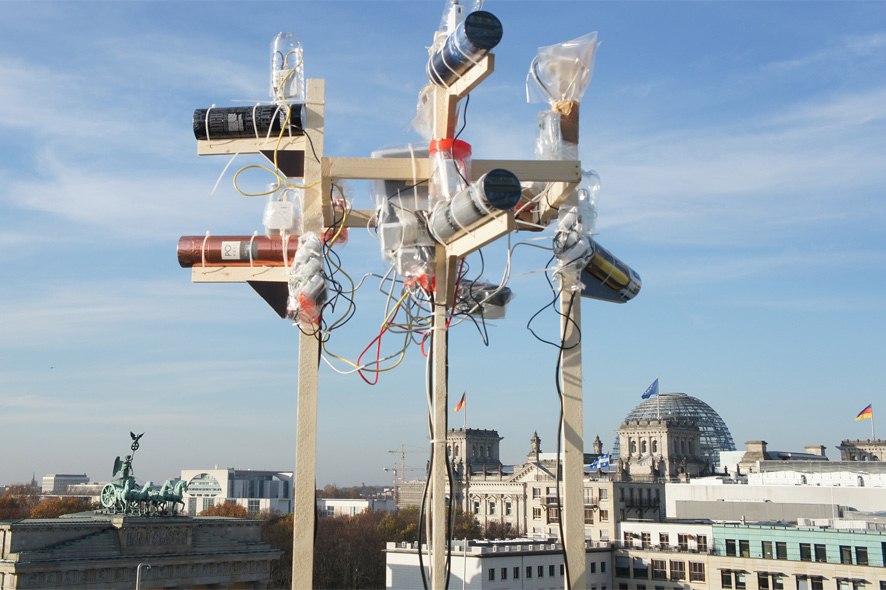
One of the antennas of “Can you hear me?” in Berlin. Credit: Christoph Wachter, Mathias Jud
How did the NSA and CGHQ react?
Mathias Jud: In general, the participants were anonymous, so it was possible that messages were posted by intelligence officers themselves and it is very likely that they have also read a lot of messages. But there are no official statements. Indeed the German Federal Prosecutor considered whether to initiate proceedings against the NSA for illegal secret service agent activity. This investigation was disengaged during the time of our installation because allegedly no evidence of the wiretapping could be found. Thus, officially, the interception of the NSA does not exist; otherwise the German authorities should have investigated. Therefore, the NSA has not officially responded or denied.
We explicitly invited the employees of the embassies and government departments to participate in the project. From parliamentary circles, secret papers on the investigation of the Snowden affair were uploaded into the network. Even before and during the installation, we wanted to inform the US and British embassies in detail. In the US embassy, an employee was appointed to be our contact person. We would have liked to present her the project; however, we were told repeatedly that she would call us back what she never did until today. The British always said that it was an art project, and according to that postulate, the British Council and not the Embassy is responsible.
To date, there was no explanation of the events in the wiretapping affair. The surveillance affair will probably never be solved. For that reason, the installation “Can you hear me?” in the Government District was a significant manifestation because something was revealed that affects all of us, about which we all know, for which, however, we have to date no answers.
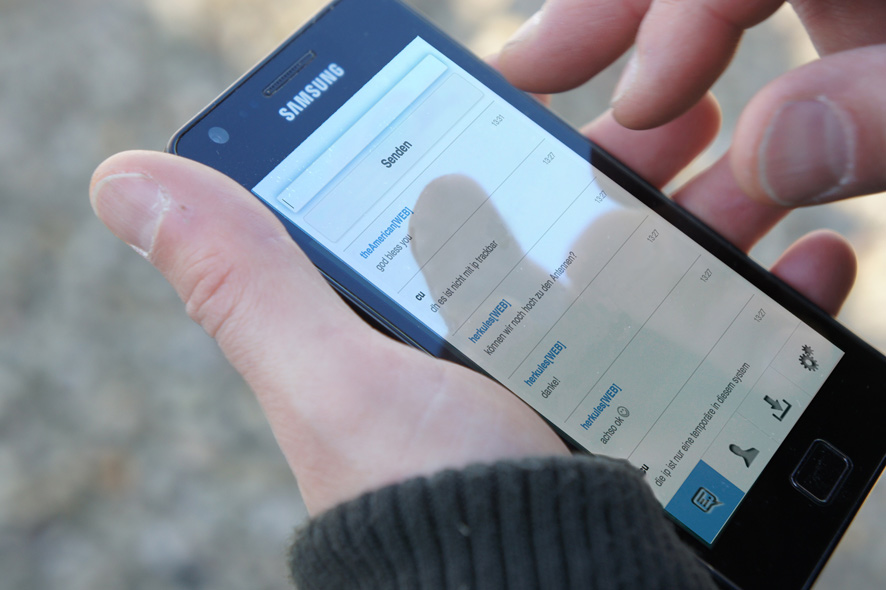
Credit: Christoph Wachter, Mathias Jud
What happened to the project after December 2014, the end of your temporary installation in Berlin?
Mathias Jud: We were overwhelmed by the success. Over 15,000 messages were sent and there was international press coverage. After the actual installation, a broad reflection on the project started and we still get a lot of feedback. Here again, we are delighted with the recognition we have received. I think it is a one-time installation that has a symbolic character and is exemplified as an art project, but what remained beyond the installation is an enthusiastic community and the great response is a drive for all of us to not accept a position of powerlessness and voicelessness without doing anything, to not stay trapped in the existing networks, but to focus more on options of creating our own networks. Sometime after our installation, Edward Snowden incidentally established a twitter account. Coincidence or not, his first statement was: “Can you hear me now?”
You’ve said that a free flow of information is vital for a vivid democracy – how does the ideal fundament of such a global connected world look like?
Mathias Jud: The conditions of democracy are revealed in connection with the mass surveillance: freedom of speech, privacy, rule of law, freedom of the press. Yet the installation “Can you hear me?” displays the dark dimension of the society in which we are. Faced with censorship and mass surveillance, our basic communication options are constantly infiltrated. That being said, something else is also of relevant interest. This speechlessness that arose could overcome the installation playfully. The installation was not only a coherent but also a bold endeavour. It was about unmasking the power relationships in the middle of Berlin’s Government District and to oppose the unspeakable with a spirit of optimism and a real course of action. This has the opportunity of free communication. I think, there is no ideal foundation for democratic freedoms; freedom cannot generally be institutionalized, but it is essential that we find and experiment new possibilities of communication if we do not want to be prisoners of a shaped perception and disabling ideas.
You were awarded the [the next idea] voestalpine Art and Technology Grant in 2012 for your project qaul.net – a set of tools for creating spontaneous independent WLAN networks. What happened to the project after 2012?
Mathias Jud: We have numerous networks set up in many places, with people fleeing, with people living in informal settlements, with activists in Syria, France, Germany, and Turkey. A community has continued to develop qaul.net and has implemented new features like apps and cryptography. We heard from adaptations in Australia and, in South America, qaul.net was used during natural disasters and network failures, in China, it was used during demonstrations. With this project we can also reflect on conditions and dependencies and we will be able to build and work together worldwide basic expression options.
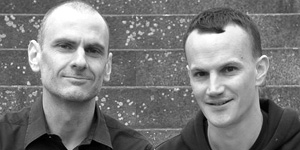
Christoph Wachter (CH) and Mathias Jud (CH) were both born in Zurich. They live and work in Berlin. They have participated in numerous international art exhibitions and been awarded many international prizes (Prix Ars Electronica, Swiss Art Award, EMARE, CECEL European Council, Edith Russ Haus, Förderpreis der Kunstministerin des Freistaats Sachsen etc.). In particular, the projects Picidae (since 2007), New Nations (since 2009) and qaul.net (since 2012) have gained worldwide interest. As open-source projects these works uncover forms of censorship of the Internet, undermine the concentration of political power and even resolve the dependency on infrastructure. The tools, provided by the artists, are used by communities in the USA, Europe, Australia, and in countries like Syria, Tunisia, Egypt, Iran, India, China, and Thailand. Even in North Korea activists participate. But not everyone is fond of these projects. In 2012 the project HOTEL GELEM they created with Roma families all over Europe received a Council of Europe award. On this occasion Manuel Valls (now Prime Minister of France) organized a counter-manifestation against the art project. The People’s Republic of China has denied Wachter and Jud a visa to enter the country since 2013.
